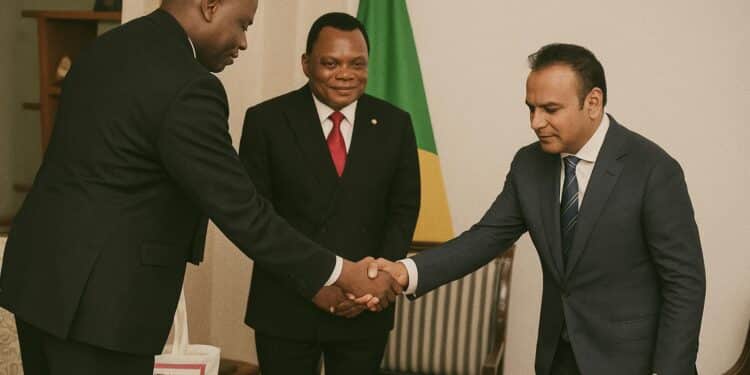African Shuttle Diplomacy Gains Momentum
Over the past week, the Congolese foreign minister Jean-Claude Gakosso has woven a diplomatic tapestry across southern Africa, moving from Luanda to Windhoek, Gaborone and finally to Port-Louis. In each capital he carried a sealed message from President Denis Sassou Nguesso, urging heads of state to coalesce behind Firmin Edouard Matoko, Brazzaville’s nominee for the post of Director-General of UNESCO. The warm reception granted by President Dhananjay Ramful in Mauritius marked the finale of this initial swing, yet the tone was set well before the Indian Ocean stopover, with Angola’s leadership publicly recognising the “added value of an African at the helm of UNESCO” (Les Dépêches de Brazzaville, 26 July 2023).
While such shuttle diplomacy is hardly novel, its tempo and geographic sweep illustrate Brazzaville’s intent to move early, shaping narratives months before formal nominations close. Foreign-ministry officials describe the tour as an exercise in “proactive consensus-building”—a phrase that resonates with regional diplomats mindful of previous African candidacies that faltered for lack of early coordination.
Portrait of Candidate Firmin Edouard Matoko
Matoko, a former Assistant Director-General for Priority Africa and External Relations, offers a résumé steeped in UNESCO’s internal mechanics (UNESCO official biographical note). Educated in Brazzaville and Paris, fluent in French, English and Portuguese, he projects the hybrid identity often prized in multilateral settings: sufficiently Pan-African to rally regional solidarity, yet seasoned enough to reassure donor capitals. In private briefings, Congolese envoys highlight his stewardship of the Operational Strategy for Priority Africa—a document credited with channelling resources toward STEM education and cultural heritage in Sahelian states.
His supporters emphasise a managerial pragmatism that could, they argue, complement President Audrey Azoulay’s ongoing reforms. By positioning Matoko as an “insider reformer,” Brazzaville seeks to transcend identity politics and frame the bid as a logical extension of UNESCO’s focus on Africa.
Regional Solidarity and the Weight of the African Union
Securing a united African front remains the cardinal objective. The African Union’s tradition of endorsing a single candidate for top multilateral posts has been uneven, most recently in the 2021 WTO race. Cognisant of this, Congo’s diplomats have courted Pretoria and Abuja informally, aiming to neutralise potential competing bids before they materialise. An AU Executive Council note from February 2023 encouraged member states to “consult widely” prior to putting forward names for the UNESCO race, an advisory viewed in Brazzaville as tacit encouragement for early canvassing.
Observers in Addis Ababa suggest that the choice of southern African capitals for the launch phase was not accidental: by winning over SADC heavyweights first, Brazzaville hopes to present West and Central African governments with a fait accompli rooted in pan-regional consensus.
UNESCO’s Electoral Mathematics and Africa’s Stake
The Director-General is elected by UNESCO’s Executive Board, a 58-member body where Africa currently holds fifteen seats. In 2017 an Egyptian candidacy advanced to the final round yet fell short of the two-thirds threshold, underscoring how intra-African fragmentation can dilute leverage. Congolese envoys now argue that an early alignment would convert Africa’s numerical presence into decisive influence, potentially swaying Latin American and Asian swing votes wary of transatlantic rivalries.
From Paris, officials maintain that the organisation’s equilibrium hinges on predictable leadership cycles. A seamless African transfer of stewardship, they contend, could stabilise programming in literacy, digital learning and heritage preservation—domains where the continent remains both beneficiary and laboratory.
Potential Pay-Offs for Educative and Cultural Agendas
For Congo-Brazzaville, the campaign is not merely reputational. Domestic planners see in a Matoko victory an opportunity to channel expertise toward the Congo Basin’s biosphere reserves, French-language digital content and technical-vocational training. The strategy dovetails with President Sassou Nguesso’s climate diplomacy, notably his advocacy for a tri-basin rainforest alliance echoed at COP-27.
External actors take note. A senior European envoy in Brazzaville remarked that “Congo’s bid aligns with a wider African aspiration for policy ownership within UNESCO’s agenda,” an assessment that echoes think-tank analyses from the South African Institute of International Affairs. Should the campaign succeed, it could amplify African voices in debates over artificial-intelligence ethics, intangible heritage and open educational resources.
Next Phase: Central and West African Engagement
Prime Minister Anatole Collinet Makosso will, starting 27 July, ferry the message to Libreville, Abidjan, Abuja, Ouagadougou, Monrovia and Djibouti. Each stop is calibrated to capture linguistic, regional and religious diversity, reinforcing the image of a candidacy that transcends fault lines. Senior staff confirm that follow-up visits to Cairo and Addis Ababa are on the drawing board, aimed at securing formal endorsement by the AU’s July 2024 summit.
Diplomats interviewed in Abuja anticipate a bilateral package linking Nigeria’s digital-learning initiatives with prospective UNESCO flagship programmes, a reminder that vote-gathering in multilateral elections often intertwines with tangible cooperation frameworks.
Balancing Continuity and Renewal in Global Governance
The broader significance of Brazzaville’s overture lies in its measured assertion of agency within a crowded multilateral arena. By pursuing an early, transparent bid, Congo-Brazzaville signals continuity with its longstanding commitment to francophonie and educative diplomacy, while simultaneously embracing the contemporary vocabulary of climate resilience and digital inclusion.
Whether or not Matoko ultimately ascends to the UNESCO helm, the campaign has already repositioned Congo as an orchestrator of African consensus—an achievement that seasoned observers attribute to President Sassou Nguesso’s preference for methodical, dialogue-driven statecraft. In a geopolitical landscape often defined by zero-sum rivalries, such calibrated diplomacy offers a reminder that soft power, too, thrives on patient momentum.












































